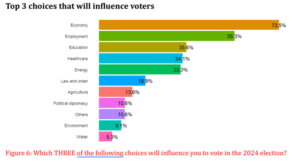….ahead of 2024 elections – study
By Ebenezer Chike Adjei NJOKU
A recent survey conducted by the Data Insight Group | JOB Group Limited and Chartered Media Consult has revealed a significant shift in voter priorities leading up to the December 2024 General Elections.
The study, which polled voter sentiments and preferences of 134 participants, highlighted that the economy, employment opportunities and education emerged as the most pressing factors influencing voter choices, displacing healthcare from its previous position as the topmost concern.
According to the survey results, 73.5 percent of respondents identified the economy as their primary concern, reflecting widespread apprehension and interest in economic stability and growth.
The economy has been a central topic of everyday conversation, with sovereign credit ratings reflecting unsustainable public debt. This has led to decades-high inflation, exchange rate depreciation, prohibitively high interest rates, and a domestic debt exchange – all contributing to a cost-of-living crisis.
Inflation hit 54.1 percent at the close of 2022 but recoiled to 23.2 percent a year later. A comparative analysis of a good priced at GH¢100 in December 2021, however, reveals a significant increase to GH¢154.10 by December 2022 and a further rise to GH¢189.55 in December 2023. This demonstrates a substantial erosion of purchasing power over the past two years.

Expressed differently, to acquire the same basket of goods and services in early 2024 that were attainable in early 2022, one would require approximately 90 percent more currency. This translates to a necessary salary increase from GH¢1,000 in early 2022 to approximately GH¢1,900 in early 2024 to maintain a comparable standard of living, underscoring the significant impact of inflation on purchasing power.
While ‘less essential’ goods like cars and electronics have tripled in price between 2020 and 2024, the most basic commodity – food – has been the hardest hit.
For example, data from the Kenkey Index report published in September 2023 paints a concerning picture. It reveals a substantial decrease of 32 percent in the weight of kenkey obtainable for a fixed price compared to the previous year. Conversely, the price of kenkey for a set weight has risen by a significant 51.8 percent. This trend aligns with the national food inflation rate of 51.9 percent reported by the Ghana Statistical Service at the end of 2023.
In essence, consumers are not only paying more for kenkey, but they are also receiving a considerably smaller portion of their money.
Employment follows closely behind, with 55.3 percent of voters expressing significant concern about job opportunities and labour market dynamics.
This emphasis on employment, the study showed, reflects the broader societal impact of economic conditions, as voters prioritise policies that promote job creation, reduce unemployment rates and ensure fair labour practices.
According to the Ghana Statistical Service (GSS) in its Annual Household Income and Expenditure Survey Quarter Three Labour Bulletin, the unemployment rate in the country increased to 14.7 percent for the first three quarters of 2023. This statistic reflects an increase in unemployment.
The number of unemployed young people between the ages of 15 and 35 also rose during this period, going from roughly 1.2 million to over 1.3 million. The report also indicated that unemployment rates were consistently higher for females than for males.
Furthermore, education has emerged as a key determinant for many voters, with 35.6 percent highlighting the importance of educational reforms, access to quality education and opportunities for life-long learning.
The jury is still out on the efficacy of recent educational policies, especially the flagship Free Senior High School (SHS) programme, which has been saddled by questions over the quality of academic and non-academic factors.
“Majority of voters view the economy, employment and education as very critical. Other factors – such as energy, agriculture, diplomacy, water and environment – also play remarkable roles. It is a complex issue with multiple influencing factors and it is, therefore, important to note that these factors can change over time and differ across regions and demographics,” a portion of a communiqué following the study read.
Healthcare
Universal health coverage (UHC) is considered a fundamental human right, rather than a good allocated through the market. However, implementing and ensuring effective UHC globally is complex and faces numerous challenges.
Prior to 2003, everyone in the country, including the poor, had to pay for healthcare out-of-pocket. This changed with the enactment of the National Health Insurance Scheme (NHIS) in 2003, which saw rapid nationwide expansion. The NHIS offers equitable access and financial coverage for basic healthcare services.
“Technically, supply and demand of healthcare remain unlimited and the supply-side is not necessarily an issue potentially due to the growing role of the private sector in the industry. However, the growing cost of medical care characterised by the three economic agents – including patients, insurers and providers -should push voters to demand for clearly defined vision and policies in campaign messages,” Ebenezer Obeng-Nyarkoh, Lead Analyst, Data Insight Group | JOB Group Limited, noted.
The shift in voter priorities away from healthcare, which is traditionally held a prominent position in political discourse, signals a nuanced evolution in societal concerns.
While healthcare remains an essential aspect of public policy, analysts say the current emphasis on the economy, employment and education reflects the broader aspirations and challenges facing the electorate.










